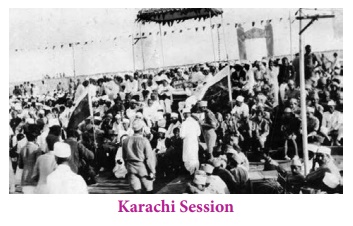Period of Radicalism in Anti-imperialist Struggles | History - Karachi Session of the Indian National Congress, 1931 | 12th History : Chapter 5 : Period of Radicalism in Anti-imperialist Struggles
Chapter: 12th History : Chapter 5 : Period of Radicalism in Anti-imperialist Struggles
Karachi Session of the Indian National Congress, 1931
Karachi Session of the Indian National Congress, 1931
The
Indian National Congress, in contrast to the violent actions of
revolutionaries, mobilised the masses for non-violent struggles. The Congress
under the leadership of Gandhi gave priority to the problems of peasants. In
the context of great agrarian distress, deepened by world-wide economic
depression, the Congress mobilised the peasantry. The Congress adopted a
no-rent and no-tax campaign as a part of its civil disobedience programme.
Under the pressure of Great Depression, socio-economic demands were sharply
articulated in its Karachi Session of the Indian National Congress.

The
freedom struggle was taking a new shape. Peasants organised themselves into
Kisan Sabhas and industrial workers were organized by the trade unions, made
their presence felt in a big way in the freedom struggle. The Indian National
Congress had become a mass party during the 1930s. The Congress leadership,
which was now taking a left turn under Nehru’s leadership, began to talk about
an egalitarian society based on social and economic justice.
The
Karachi session held in March 1931, presided over by Sardar Valabhbhai Patel,
adopted a resolution on Fundamental Rights and Duties and provided an insight
into what the economic policy of an independent India. In some ways, it was the
manifesto of the Indian National Congress for independent India. These rights and
the social and economic programmes were derived from a firm conviction that
political freedom and economic freedom were inseparable.
Even a
cursory look at the fundamental rights resolution will tell you that all the
basic rights that the British denied to the Indians found a prominent place in
the Resolution. The colonial government curtailed civil liberties and freedom
by passing draconian acts and ordinances. Gandhian ideals and Nehru’s socialist
vision also found a place in the list of rights that the Indian National
Congress promised to ensure in free India. The existing social relations,
especially the caste system and the practice untouchability, were also
challenged with a promise to ensure equal access to public places and
institutions.
The
Fundamental Rights, in fact, found a place in the Part III of the Constitution
of India– Fundamental Rights - and some of them went into Part IV, the
Directive Principles of the State policy. You will study more on these in unit
13 of the second volume in the discussion on the Constitution of India.
Related Topics